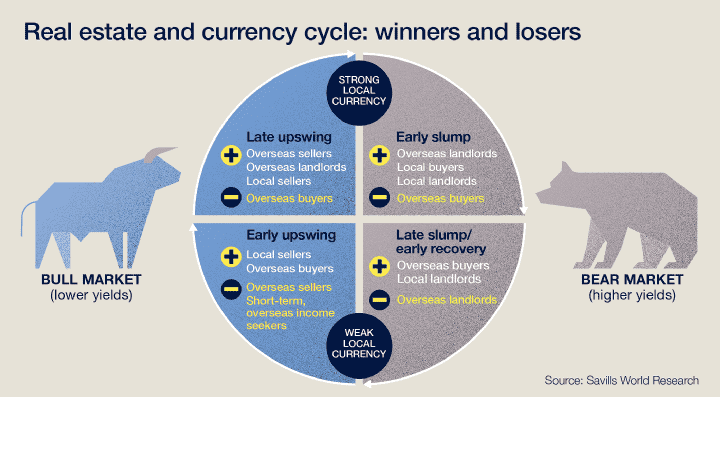Cross-border buyers will spot opportunities when currencies are cheap and overseas real estate looks better value in relation to their home markets. This can add a dynamic, often countercyclical, to local housing markets with a high proportion of overseas buyers.
Bear markets caused by an economic downturn often coincide with a weak currency. Here, foreign currency buyers can be the first to reinvigorate a market where they see the long-term demand fundamentals are sound. Those looking for capital growth may be further encouraged by a currency play if the value of the currency in which their new asset is denominated is likely to rise against their home currency.
The downside to this strategy occurs for buyers seeking regular income from the investment – in their home currency. Low exchange rates may make a property look like a bargain at point of purchase, but falling foreign exchange rates will impoverish any rental income. Overseas buyers will often seek higher yields than domestic buyers at this stage of the cycle. A degree of domestic capital value correction is therefore often needed before overseas income investors are encouraged into early bear markets.
In bull markets, where both capital growth and a strengthening currency have been experienced, overseas owners may be inclined to sell and take the real-estate and exchange-rate profits. This can add liquidity into local markets which, at this stage, risk becoming sluggish and expensive as properties acquire a rarity value in low-turnover but high-demand markets. Without willing sellers, markets risk becoming bubbles during this phase so overseas owners can act as a welcome lubricant in an otherwise sticky situation.
In the same bull markets, overseas owners investing for income rather than capital growth might be inclined to delay profit-taking to enjoy a currency-enhanced income. They risk missing a selling opportunity if the market and/or the local currency then turns down. Consequently, income investors from overseas may be more likely to take a long-term view, investing over more than one property cycle. The most sophisticated might use hedging products to reduce their currency risks but these can be costly and reduce overall returns significantly.
(1).jpg)

.png)
.jpg)
.jpg)




(1).jpg)
.jpg)
